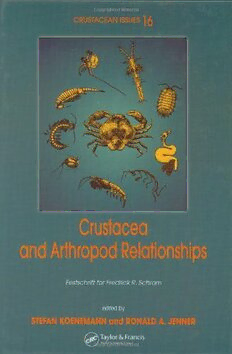Download Crustacea and Arthropod Relationships PDF Free - Full Version
Download Crustacea and Arthropod Relationships by Stefan Koenemann, Ronald Jenner in PDF format completely FREE. No registration required, no payment needed. Get instant access to this valuable resource on PDFdrive.to!
About Crustacea and Arthropod Relationships
Compared to other arthropods, crustaceans are characterized by an unparalleled disparity of body plans. Traditionally, the specialization of arthropod segments and appendages into distinct body regions has served as a convenient basis for higher classification; however, many relationships within the phylum Arthropoda still remain controversial. Can Crustacea even be considered a monophyletic group? If so, then which are their closest relatives within the Arthropoda? The answers to questions such as these will play a key role in understanding patterns and processes in arthropod evolution, including the disappearance of certain body plans from the fossil record, as well as incidences of transition from aquatic to terrestrial environments. Crustacea and Arthropod Relationships, written by a team of internationally recognized experts, presents a wide variety of viewpoints, while offering an up-to-date summary of recent progress across several disciplines. With rich detail and vibrancy, it addresses the evolution and phylogenetic relationships of the Arthropoda based upon molecular, developmental, morphological, and paleontological evidence. Volume 16 is the first in the series to not be exclusively dedicated to discussions specific to crustaceans. While it is still crustaceo-centric, the focus of this volume has been extended to include other groups of arthropods along with the Crustacea. This wider focus offers challenging opportunities to evaluate higher-level relationships within the Arthropoda from a carcinologic perspective. This volume is dedicated to the career of Frederick R. Schram, the founding editor of CrustaceanIssues in 1983, in recognition of his many stimulating and wide-ranging contributions to the evolutionary biology of arthropods in general, and of crustaceans in particular.
Detailed Information
| Author: | Stefan Koenemann, Ronald Jenner |
|---|---|
| Publication Year: | 2005 |
| Pages: | 440 |
| Language: | English |
| File Size: | 10.579 |
| Format: | |
| Price: | FREE |
Safe & Secure Download - No registration required
Why Choose PDFdrive for Your Free Crustacea and Arthropod Relationships Download?
- 100% Free: No hidden fees or subscriptions required for one book every day.
- No Registration: Immediate access is available without creating accounts for one book every day.
- Safe and Secure: Clean downloads without malware or viruses
- Multiple Formats: PDF, MOBI, Mpub,... optimized for all devices
- Educational Resource: Supporting knowledge sharing and learning
Frequently Asked Questions
Is it really free to download Crustacea and Arthropod Relationships PDF?
Yes, on https://PDFdrive.to you can download Crustacea and Arthropod Relationships by Stefan Koenemann, Ronald Jenner completely free. We don't require any payment, subscription, or registration to access this PDF file. For 3 books every day.
How can I read Crustacea and Arthropod Relationships on my mobile device?
After downloading Crustacea and Arthropod Relationships PDF, you can open it with any PDF reader app on your phone or tablet. We recommend using Adobe Acrobat Reader, Apple Books, or Google Play Books for the best reading experience.
Is this the full version of Crustacea and Arthropod Relationships?
Yes, this is the complete PDF version of Crustacea and Arthropod Relationships by Stefan Koenemann, Ronald Jenner. You will be able to read the entire content as in the printed version without missing any pages.
Is it legal to download Crustacea and Arthropod Relationships PDF for free?
https://PDFdrive.to provides links to free educational resources available online. We do not store any files on our servers. Please be aware of copyright laws in your country before downloading.
The materials shared are intended for research, educational, and personal use in accordance with fair use principles.

